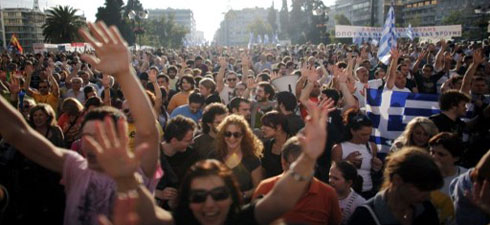When Stéphane Hessel wrote in Time for Outrage! that indignation with injustice should turn to "a peaceful insurrection" perhaps he did not expect that the movement of indignados in Spain and aganaktismenoi (outraged) in Greece would take his advice to heart so soon and so spectacularly.
The Greek resistance to the catastrophic economic measures was expected. Throughout modern history the Greeks have resisted foreign occupation and domestic dictatorship with determination and sacrifice. The measures imposed by the IMF, EU and European Central Bank with the full accord, if not invitation, of the Greek government, have led to 11 one-day general strikes, numerous regional strikes and imaginative acts of resistance. Domestic and foreign media avidly reported the confrontations between youths and the riot police that followed major demonstrations and left a thick cloud of teargas hanging over Athens. Led by the parties of the left and some unions, these protests outshone the anti-austerity demonstrations in the rest of Europe. But the relentless scare campaign by establishment media, experts and elite intellectuals spread fear and guilt to the majority of the population and soon succeeded in limiting resistance.
Three weeks ago, things changed. A motley multitude of indignant men and women of all ideologies, ages, occupations, including the many unemployed, began occupying Syntagma – the central square of Athens opposite parliament; the area around White Tower in Thessaloniki; and public spaces in other major cities. The daily occupations and rallies, sometimes involving more than 100,000 people, have been peaceful, with the police observing from a distance. Calling themselves the "outraged", the people have attacked the unjust pauperising of working Greeks, the loss of sovereignty that has turned the country into a neocolonial fiefdom of bankers, and the destruction of democracy. Their common demand is that the corrupt political elites who have ruled the country for some 30 years and brought it to the edge of collapse should go. Political parties and banners are discouraged.
Thousands of people come together daily in Syntagma to discuss the next steps. The parallels with the classical Athenian agora, which met a few hundred metres away, are striking. Aspiring speakers are given a number and called to the platform if that number is drawn, a reminder that many office-holders in classical Athens were selected by lots. The speakers stick to strict two-minute slots to allow as many as possible to contribute. The assembly is efficiently run without the usual heckling of public speaking. The topics range from organisational matters to new types of resistance and international solidarity, to alternatives to the catastrophically unjust measures. No issue is beyond proposal and disputation. In well-organised weekly debates, invited economists, lawyers and political philosophers present alternatives for tackling the crisis. Read full article in the Guardian...
Was this article useful? If so we are delighted!
It is freely available because we believe that the right to free and independent information is essential for democracy. But this right is not guaranteed forever, and independence comes at a cost. We need your support in order to continue publishing independent, multilingual news for all Europeans.
Discover our subscription offers and their exclusive benefits and become a member of our community now!












